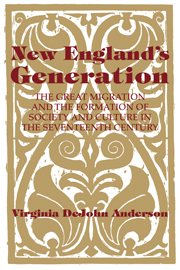 New England's Generation
New England's Generation 5 - Legacy
Published online by Cambridge University Press: 24 January 2011
Summary
At the age of seventy-seven, Edmund Batter could look back on a long and productive life. He had emigrated to Massachusetts on the James with his wife, Sarah, a half-century earlier and settled in the port town of Salem. Although trained as a maltster, he had turned to a career in commerce and succeeded handsomely, amassing an estate worth over £1,000. An impressive political career had complemented his financial success: He had served in an array of Salem town offices and repeatedly represented his community in the General Court. A member of the Salem church since his first year in town, he had been a staunch defender of Puritan orthodoxy. When Quakers first entered Salem in the 1650s, Batter strove to silence them, occasionally by the most direct means. At one memorable town meeting in 1658, Batter grabbed one of the offenders by the hair and stuffed a glove and a handkerchief into his mouth.
Now, however, in the February chill of 1685, Batter turned from public to private matters, setting his worldly affairs in order before the Lord called his “precious soul” to judgment. Batter needed to consider the welfare of the woman who would soon become his widow, as well as of their four children, all of whom were minors. Batter knew that his economic success would carry them through the crisis of his death and stipulated the customary division of his estate.
- Type
- Chapter
- Information
- New England's GenerationThe Great Migration and the Formation of Society and Culture in the Seventeenth Century, pp. 177 - 221Publisher: Cambridge University PressPrint publication year: 1991
